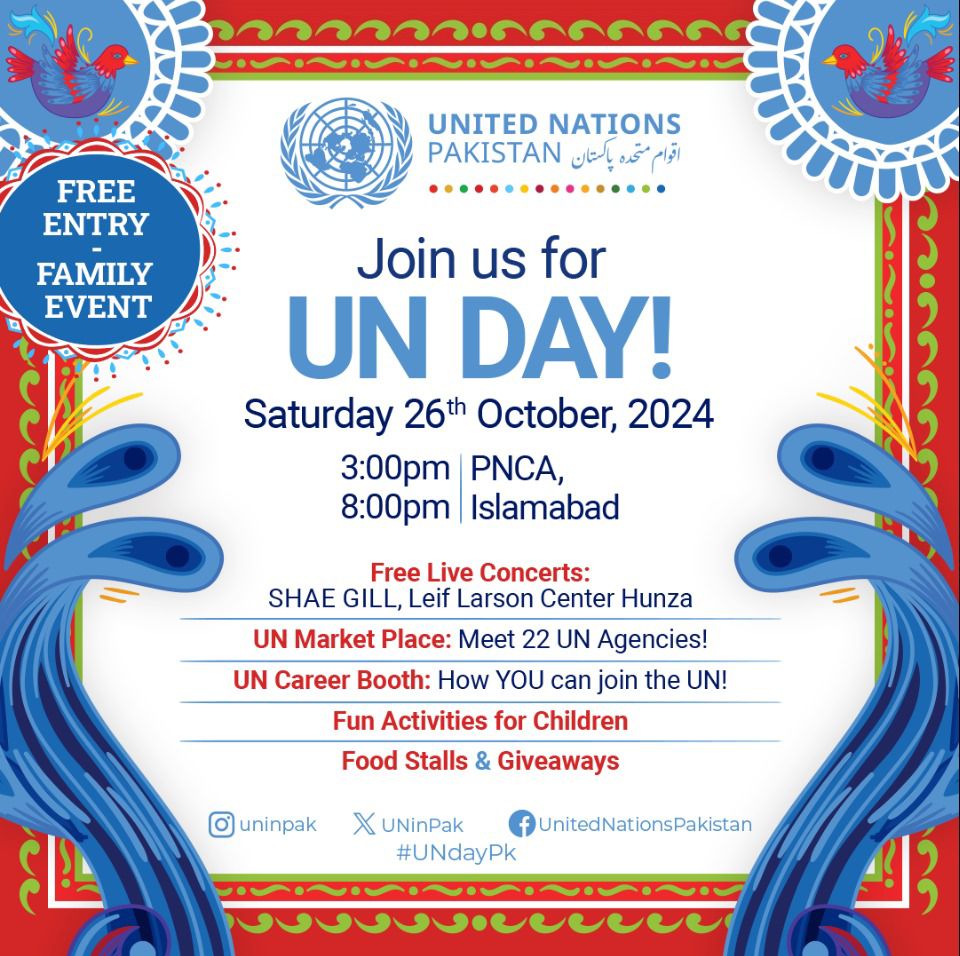
Family-oriented event at PNCA Islamabad to mark 79th anniversary of creation of the UN and its common history with Pakistan
ISLAMABAD : – Today marks the 79th anniversary of the United Nations. It officially came into being with the ratification of the UN Charter by Member States on 24 October 1945. Pakistan joined the UN two years later, inaugurating a nearly eight-decades long strong relationship. UN Day, celebrated every year, offers the opportunity to reaffirm the purposes and principles of the UN Charter that have guided the world for nearly eight decades.
This Saturday, the United Nations in Pakistan is inviting the public to join a family-oriented event that will celebrate “UN Day” at the Pakistan National Council of the Arts (PNCA) in Islamabad on Saturday 26th afternoon.
The UN and Pakistan share a decades-long history. Several Pakistanis were instrumental to the development of the UN and of its values – from Begum Shaista Ikramullah and Ahmad Shah Bokhari, UN delegates who supported the drafting of the Universal Declaration on Human Rights and the creation of the UN agency for children, to Pakistani economist Mahbub ul Haq who created the Human Development Index, and Dr. Nafis Sadik, the first woman to lead one of the UN’s major voluntarily funded programme.
UN Day in Islamabad will feature free live performances by Pakistani artists, including Shae Gill and the Leif Larson Music Center in Hunza. A Career Booth will help people learn how they can apply for a career at the UN, with UN Human Resources teams sharing tips and advice. At a ‘UN Market Place’, the public will meet the teams of 23 UN agencies operating in Pakistan, and learn about their activities. An exhibition will feature the common history between the UN and Pakistan. Fun activities for children, selfie corners, food stalls and giveaways will also be featured. The doors of this family-oriented event will open at 3:00 pm; entry is free.
There are currently 24 UN institutions based in Pakistan, with 266 offices across the country. The UN support the Government and People to bring about progress for all – better access to quality basic services, gender equality and women’s empowerment, climate action, economic growth and decent employment, and a more efficient governance which includes digital transformation.
In September this year, word leaders adopted the United Nations’ ‘Pact for the Future’ in New York. From sustainable development and climate action to digital governance and youth empowerment, it provides a comprehensive roadmap of global cooperation for addressing the most pressing issues of our time. Despite ongoing challenges, no other global organization with the legitimacy, convening power and normative impact of the UN.